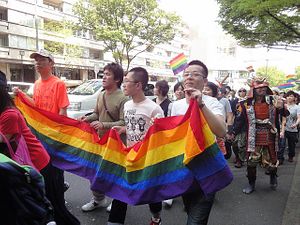Last week, same-sex couples in Tokyo’s Shibuya ward could be seen holding up a rainbow banner with the words “Thank You Shibuya.” Since April 1, same-sex couples have been able to apply for certification of their partnership, which will essentially grant the couple equal treatment and rights to marriage. Gay couples are able to rent or buy property together, or be recognized as family for hospital visitation rights. The ward will be encouraging businesses to recognize the certificate, although there will be no penalties for those that don’t.
Traditionally, Japan has actually been rather tolerant towards same-sex couples, but they are not afforded any protection under Japanese law. Equal marriage rights have seldom been discussed. According to a recent survey conducted by the Sankei newspaper and Fuji Television Network, more than half of Japanese support the legalization of same-sex partnerships, and nearly 60 percent are in support of Shibuya’s new regulation. The ward’s groundbreaking move may prove to be a first step along the path to recognition of same-sex partnerships in Japan.
Although the topic has rarely been discussed, it is hardly taboo. In Japan, there are no religious or traditional restrictions on gay marriage. Rather, the country adopts a “live and let live” philosophy; one of Tokyo’s largest gay districts Shinjuku Nichome, remains a popular nightlife destination for young people.
While the Japanese public might approve of marriage equality, conservative Prime Minister Shinzo Abe, who happens to live in Shibuya, and his party have expressed strong objections to the ward’s regulation, saying that it undermined tradition and was a threat to Japanese households. Some conservatives have claimed that marriage equality would have a negative impact on Japan’s declining population. Changing the charter to allow same-sex marriage must proceed with “extremely cautious consideration,” says Abe.
Despite the opposition, Japan’s traditional family values are gradually becoming more relaxed with the rise of feminism and increasingly liberal attitudes toward gender. Certainly the nation has come a long way since the ie system, which some conservative Japanese argue is a “tradition,” was introduced in 1898 by the Meiji government. Under the system, a family would consist of the grandparents, their son, his wife, and their children. It was based on the samurai system of patriarchy, in which males were given the power over the household. The ie system was abolished in 1947, a result of the women’s suffrage movement that helped women take on more active roles in society.
Still, Japan is a conservative country where communities remain very tightknit. Minorities struggle to find a voice, and are often victim to bullying. As the old Japanese saying goes: “the nail that sticks out will get hammered down.” Commenting on the new regulation, Shibuya’s mayor Toshitake Kuwahara said that “the purpose was to realize a society where everybody could live in hope.” A somewhat more cynical take might also note that the regulation could potentially attract new couples to Shibuya, providing a boost in income. Regardless, the LGBT community is a small step closer to having its rights recognized throughout the nation.

































